Elektra, Royal Opera | reviews, news & interviews
Elektra, Royal Opera
Elektra, Royal Opera
Revival hits the horrid heart of the matter in Richard Strauss's poleaxing masterpiece
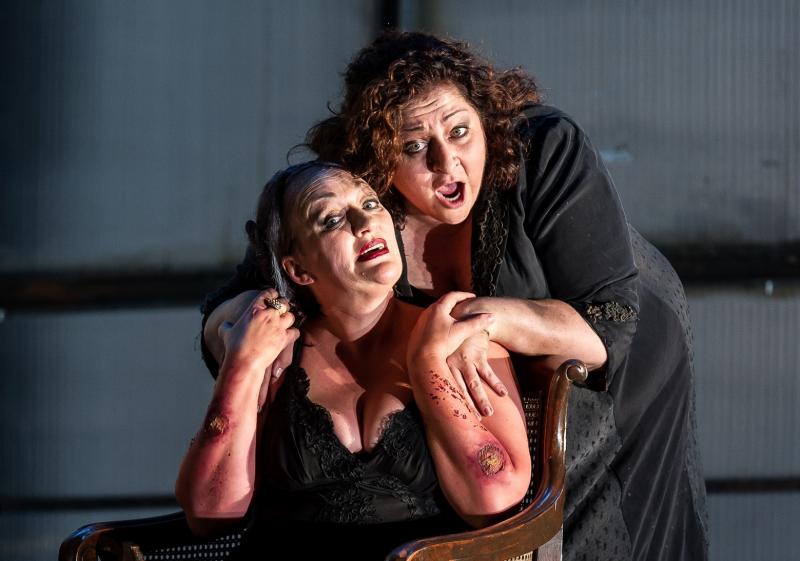
“Strike again,” cries Elektra as her brother stabs their mother to death. It’s third strike lucky for this Covent Garden production of Richard Strauss and Hugo von Hofmannsthal’s singular mythic horror. In previous manifestations of designer-director Charles Edwards’ rather over-freighted but ever improving staging, conductors Semyon Bychkov and Mark Elder, as well as top-less soprano Lisa Gasteen and the more nuanced but sometimes underpowered Susan Bullock, missed the heart of the matter.
Which they mostly did, even if the total revelation lay elsewhere. Nelsons hits hard and loud from the start, with stunning emphasis on burrowing bass lines – Elektra’s search for the axe which felled father Agamemnon – and growling lower brass. Every one of Strauss’s illustrative textures for Hofmannsthal’s vivid images leaps out, especially the baying hounds and the beaked demons sucking guilty mother Klytämnastra’s blood. Nelsons knows how to be delicate and expressive with the moments of chamber music and draws us into the dream of Elektra’s lullaby for newly-regained brother Orest.
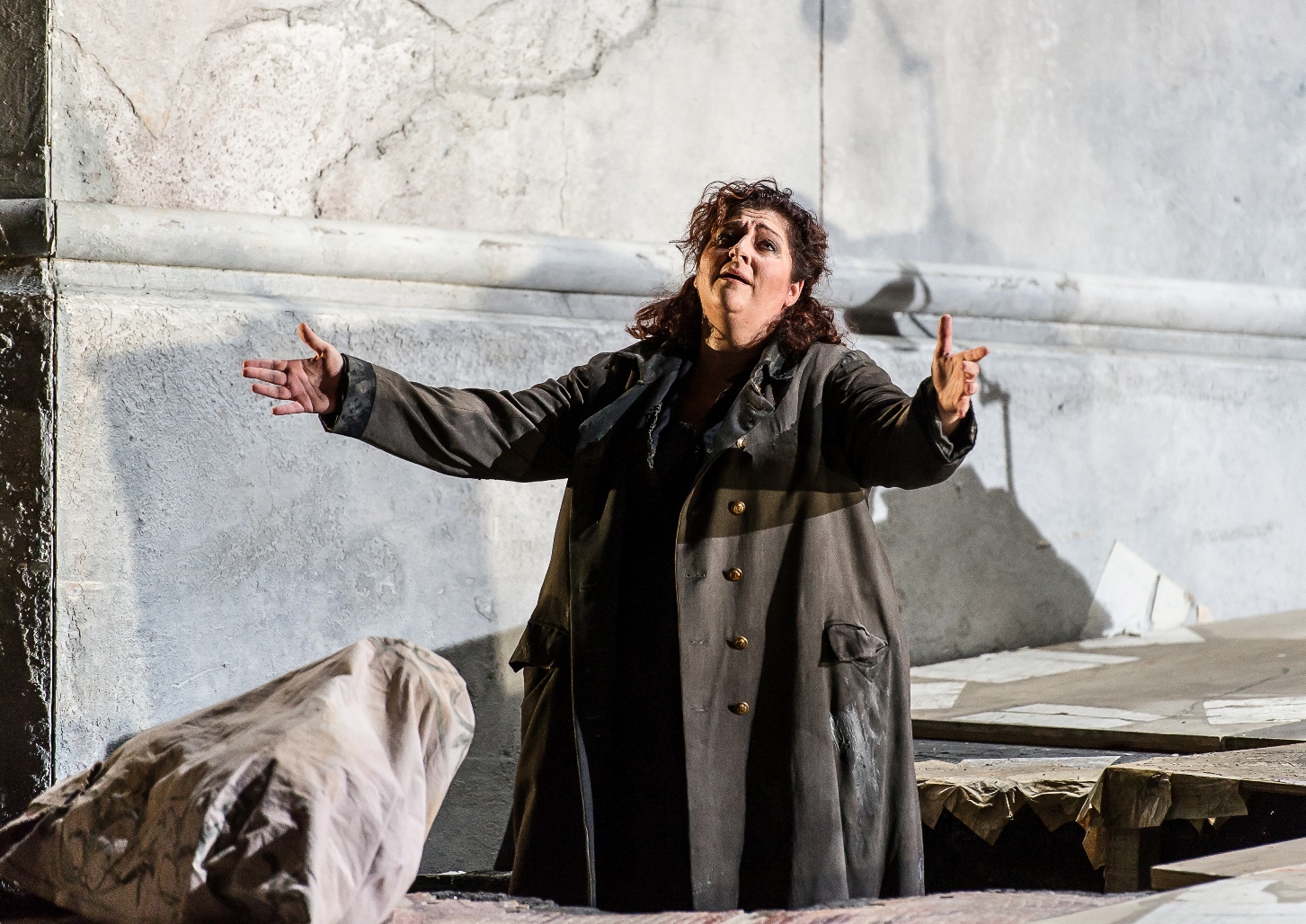 Yet I still can’t forget how Christian Thielemann before his aggrandisement really did get the Royal Opera orchestra to play whole portions of this blood-red, jet-black monumental score as Strauss, with witty hyperbole, said he wanted – “like fairy music by Mendelssohn”. You can tell I’ve joined the bunch of oldies who say “but you should have seen…” when I add that if you think Goerke’s good (her Elektra pictured above) – and the crowd went wild at the end – you should have seen Birgit Nilsson, Hildegard Behrens, Gwyneth Jones or even Eva Marton in this house. This is exactly the right sort of hefty voice in the middle range, but the fast-vibratoed pressure prevents long lines from blossoming, and the top notes, though all there, sound constricted.
Yet I still can’t forget how Christian Thielemann before his aggrandisement really did get the Royal Opera orchestra to play whole portions of this blood-red, jet-black monumental score as Strauss, with witty hyperbole, said he wanted – “like fairy music by Mendelssohn”. You can tell I’ve joined the bunch of oldies who say “but you should have seen…” when I add that if you think Goerke’s good (her Elektra pictured above) – and the crowd went wild at the end – you should have seen Birgit Nilsson, Hildegard Behrens, Gwyneth Jones or even Eva Marton in this house. This is exactly the right sort of hefty voice in the middle range, but the fast-vibratoed pressure prevents long lines from blossoming, and the top notes, though all there, sound constricted.
That's especially obvious alongside the totally liberated, golden sounds of Adrianne Pieczonka, the revelation, as pampered, neurotic, child-yearning sister Chrysothemis. Hers are the money notes, the free and easy but always intense sound which establishes her as one degree away from coping with the title role (and why have we not seen this singer at Covent Garden since her fine Donna Anna back in 2002?).
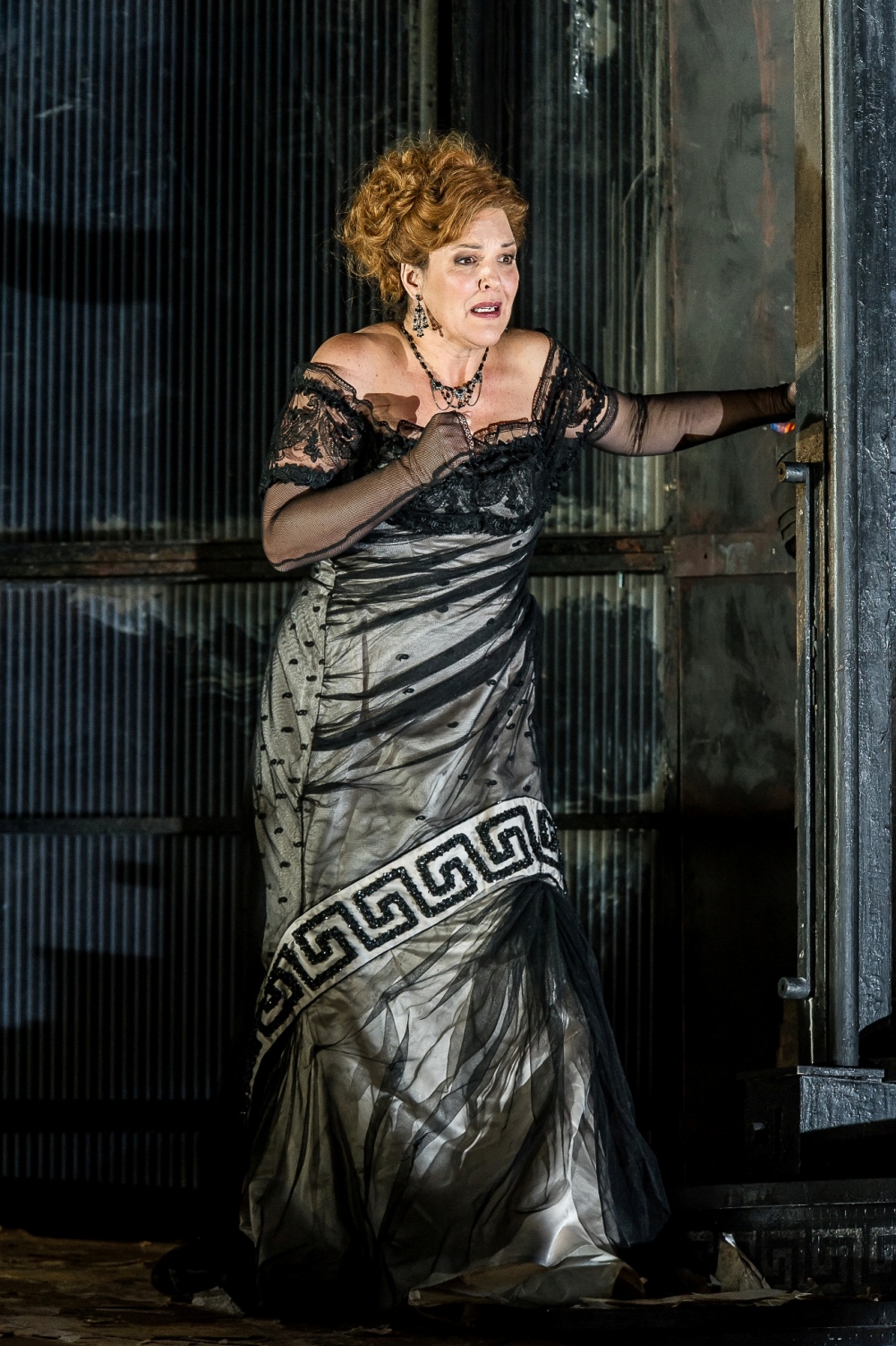 Pieczonka (pictured left) looks terrific, too, in one of Brigitte Reiffenstuel's costume designs which so wryly mirror Edwards's queasy mix of pre- and post-World War One fashions with ancient Greek accountrements. The essential magic, though, lies in the siblings’ interaction. Goerke’s characterization is by no means all savage domination; she’s a big woman, but she has big stricken, soulful eyes, too, and makes it quite clear that Elektra's hunger to be loved is still intensely human.
Pieczonka (pictured left) looks terrific, too, in one of Brigitte Reiffenstuel's costume designs which so wryly mirror Edwards's queasy mix of pre- and post-World War One fashions with ancient Greek accountrements. The essential magic, though, lies in the siblings’ interaction. Goerke’s characterization is by no means all savage domination; she’s a big woman, but she has big stricken, soulful eyes, too, and makes it quite clear that Elektra's hunger to be loved is still intensely human.
Michaela Schuster as the boil ridden mad mother could sometimes do with more of Goerke’s quality of stillness. Nor can she hope to establish the moments of sympathy when Edwards has her immediately poised to cut the throat of a half-dead maid (Jennifer Check, who does a good job of crawling once she’s proved herself a rather wild Elektra in waiting in the first scene).
Even so, an intelligent German singer’s realization of the juicy text is not to be underestimated, and her cautious advances to a daughter who seems to be in sympathetic mood are wonderfully coloured. Schuster has the upper-range strength for the crisis, too, the only area in which the previous regent, Felicity Palmer, was lacking. The awful anguish of Klytämnestra's daymares was the first point at which my flesh truly began to creep, which is right: Strauss goes deepest here, and a fine article in the programme by Chris Walton sheds further light on the mental problems of the composer’s own mother which surely led him to mine something truly disturbing here.
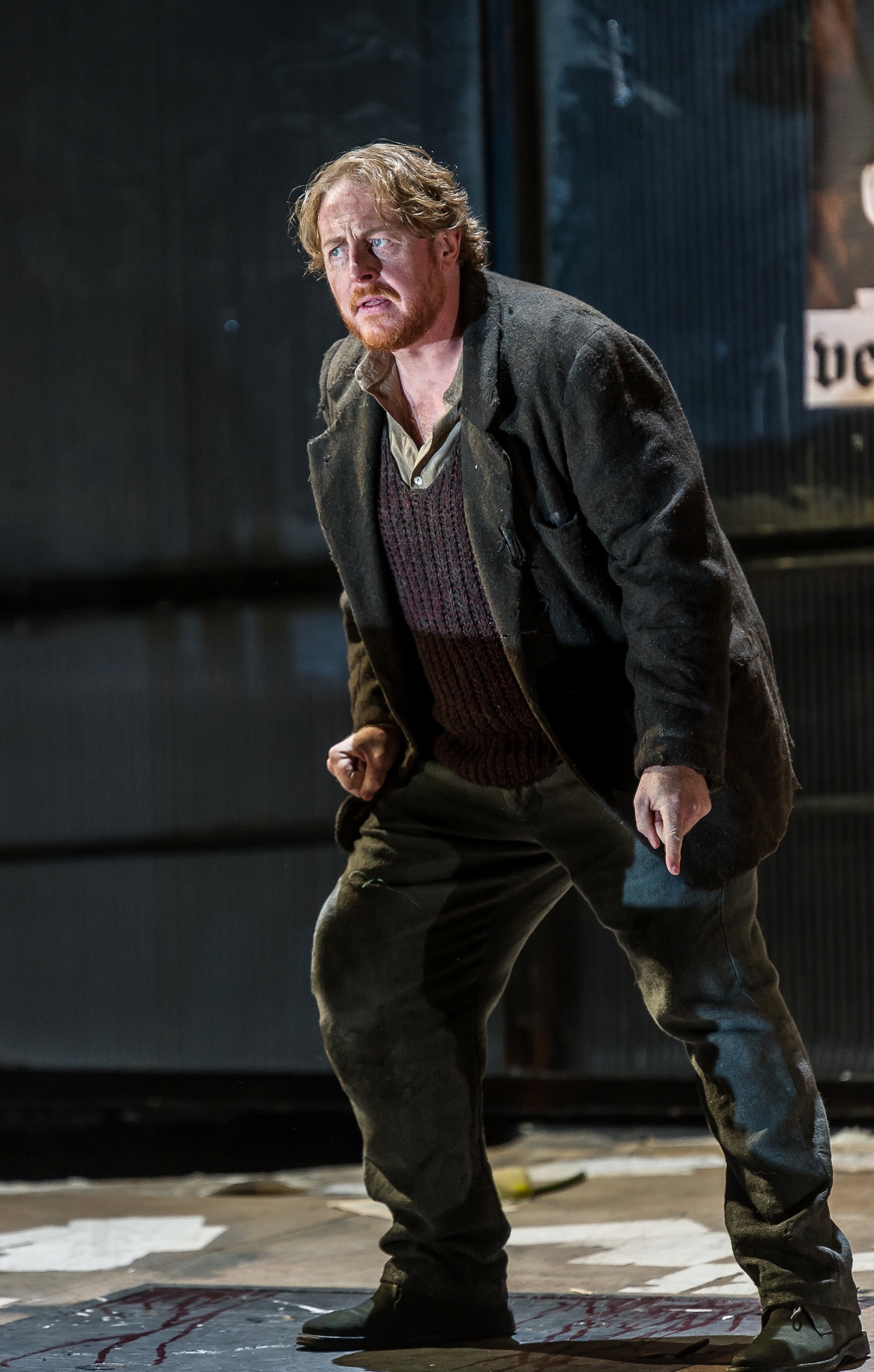 The other crucial encounter is with a brother Elektra has just accepted as dead. Iain Paterson (pictured right) is now unquestionably a very fine artist, even if his voice inclines more to the baritonal than to the bass depths the role of Orest also requires. It’s here, in the great recognition scene, that Goerke needs more of the flames of tenderness that Bullock brought, though she just about pulls it off (no way would I want to see her Ariadne, mind).
The other crucial encounter is with a brother Elektra has just accepted as dead. Iain Paterson (pictured right) is now unquestionably a very fine artist, even if his voice inclines more to the baritonal than to the bass depths the role of Orest also requires. It’s here, in the great recognition scene, that Goerke needs more of the flames of tenderness that Bullock brought, though she just about pulls it off (no way would I want to see her Ariadne, mind).
She’s amusing in her little come-hither finger wag and her desk-lamp semaphoring to the doomed Ägisth (welcome back to London, John Daszak) as Nelsons makes the strings swoon in Viennese waltz-parody. And the final scene where Elektra’s victory stomp can only end in death makes the pulses race and the head spin. I even buy Edwards’ ultimate symbolic overload when the singers are so much to the fore and Pieczonka nails every despairing note. Here music-drama’s unique capacity to attract and repel, exhilarate and depress simultaneously is dazzlingly well served by the conductor and singers of a Royal Opera revival which really kicks you in the guts.
MORE RICHARD STRAUSS ON THEARTSDESK
Der Rosenkavalier, Royal Opera (2009). Uneven revival of John Schlesinger’s 25-year-old production
Capriccio, Grange Park Opera (2010). Lively staging, stylish singing and a welcome intrusion of wartime reality
Salome, Royal Opera (2010). Angela Denoke's mercurial Salome (pictured below by Clive Barda) shimmers in Strauss's monstrously beautiful opera
Ariadne auf Naxos, Welsh National Opera (2010). Hoffmansthal's libretto is all about fidelity. This updating is faithful, up to a point
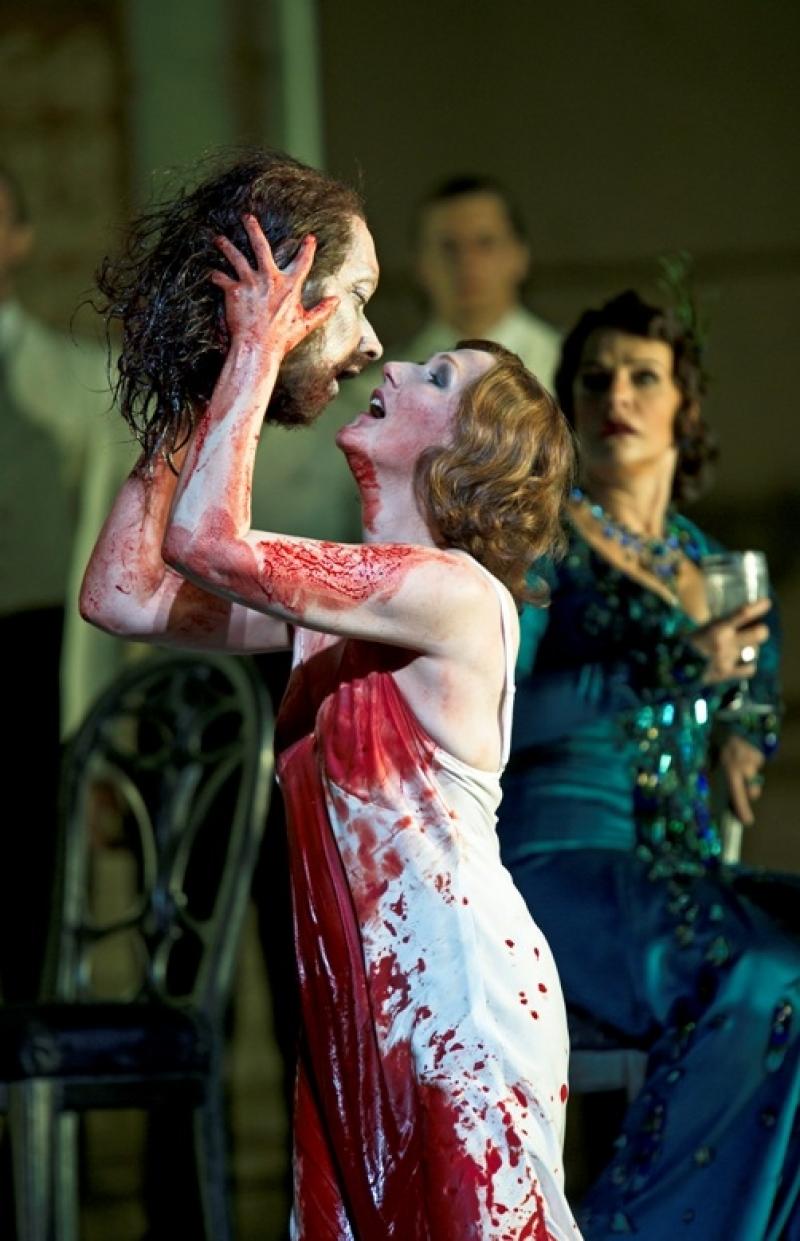 Intermezzo, Scottish Opera (2011). Soprano Anita Bader graces a Klimtian take on Richard Strauss's domestic comedy
Intermezzo, Scottish Opera (2011). Soprano Anita Bader graces a Klimtian take on Richard Strauss's domestic comedy
Die Frau ohne Schatten, Mariinsky Opera (2011). Strauss's massive fairy tale makes a rare outing in Gergiev’s musically strong venture at the Edinburgh Festival
Der Rosenkavalier, English National Opera (2012). David McVicar and Edward Gardner deliver a riveting account of Strauss's popular opera with Amanda Roocroft as the Marschallin
Intermezzo, Buxton Festival (2012). Fine style in Strauss's comedy-with-feeling
Ariadne auf Naxos, Glyndebourne Festival Opera (2013). Strauss's opera reluctantly enters the Battle of Britain courtesy of a young German director
Capriccio, Royal Opera (2013). Renée Fleming leads superlative cast in concert performance of Strauss's operatic debate
Die Frau ohne Schatten, Royal Opera (2014). Compelling dream-interpretation of Strauss's myth graced by fine singing and Semyon Bychkov’s conducting
Der Rosenkavalier, Glyndebourne (2014). Richard Jones finds new order in rococo comedy for music, with Kate Royal as the Marschallin
Salome, BBC Proms (2014). Nina Stemme stuns with Donald Runnicles and the Deutsche Oper Berlin in a giddying account of Strauss's incredible score at the Proms
Ariadne auf Naxos, Royal Opera (2014). Two nymphs are the real revelation in this revival of evergreen hybrid
Salome, Symphony Hall, Birmingham (2015). Lise Lindstrom steals the show from Karabits and Bournemouth SO as a sensual Strauss anti-heroine in concert
Der Rosenkavalier, Royal Opera (2016). Robert Carsen's handsome production with Renée Fleming is elevated by superb orchestral playing
rating
Share this article
The future of Arts Journalism
You can stop theartsdesk.com closing!
We urgently need financing to survive. Our fundraising drive has thus far raised £49,000 but we need to reach £100,000 or we will be forced to close. Please contribute here: https://gofund.me/c3f6033d
And if you can forward this information to anyone who might assist, we’d be grateful.

Subscribe to theartsdesk.com
Thank you for continuing to read our work on theartsdesk.com. For unlimited access to every article in its entirety, including our archive of more than 15,000 pieces, we're asking for £5 per month or £40 per year. We feel it's a very good deal, and hope you do too.
To take a subscription now simply click here.
And if you're looking for that extra gift for a friend or family member, why not treat them to a theartsdesk.com gift subscription?
more Opera
 Káťa Kabanová, Glyndebourne review - emotional concentration in a salle modulable
Janáček superbly done through or in spite of the symbolism
Káťa Kabanová, Glyndebourne review - emotional concentration in a salle modulable
Janáček superbly done through or in spite of the symbolism
 Buxton International Festival 2025 review - a lavish offering of smaller-scale work
Allison Cook stands out in a fascinating integrated double bill of Bernstein and Poulenc
Buxton International Festival 2025 review - a lavish offering of smaller-scale work
Allison Cook stands out in a fascinating integrated double bill of Bernstein and Poulenc
 Tosca, Clonter Opera review - beauty and integrity in miniature
Happy surprises and a convincing interpretation of Puccini for today
Tosca, Clonter Opera review - beauty and integrity in miniature
Happy surprises and a convincing interpretation of Puccini for today
 Hamlet, Buxton International Festival review - how to re-imagine re-imagined Shakespeare
Music comes first in very 19th century, very Romantic, very French operatic creation
Hamlet, Buxton International Festival review - how to re-imagine re-imagined Shakespeare
Music comes first in very 19th century, very Romantic, very French operatic creation
 Falstaff, Glyndebourne review - knockabout and nostalgia in postwar Windsor
A fat knight to remember, and snappy stagecraft, overcome some tedious waits
Falstaff, Glyndebourne review - knockabout and nostalgia in postwar Windsor
A fat knight to remember, and snappy stagecraft, overcome some tedious waits
 Salome, LSO, Pappano, Barbican review - a partnership in a million
Asmik Grigorian is vocal perfection in league with a great conductor and orchestra
Salome, LSO, Pappano, Barbican review - a partnership in a million
Asmik Grigorian is vocal perfection in league with a great conductor and orchestra
 Semele, Royal Opera review - unholy smoke
Style comes and goes in a justifiably dark treatment of Handelian myth
Semele, Royal Opera review - unholy smoke
Style comes and goes in a justifiably dark treatment of Handelian myth
 Le nozze di Figaro, Glyndebourne review - perceptive humanity in period setting
Mostly glorious cast, sharp ideas, fussy conducting
Le nozze di Figaro, Glyndebourne review - perceptive humanity in period setting
Mostly glorious cast, sharp ideas, fussy conducting
 Fidelio, Garsington Opera review - a battle of sunshine and shadows
Intimacy yields to spectacle as Beethoven's light of freedom triumphs
Fidelio, Garsington Opera review - a battle of sunshine and shadows
Intimacy yields to spectacle as Beethoven's light of freedom triumphs
 Dangerous Matter, RNCM, Manchester review - opera meets science in an 18th century tale
Big doses of history and didaction are injected into 50 minutes of music theatre
Dangerous Matter, RNCM, Manchester review - opera meets science in an 18th century tale
Big doses of history and didaction are injected into 50 minutes of music theatre
 Mazeppa, Grange Park Opera review - a gripping reassessment
Unbalanced drama with a powerful core, uninhibitedly staged
Mazeppa, Grange Park Opera review - a gripping reassessment
Unbalanced drama with a powerful core, uninhibitedly staged
 Saul, Glyndebourne review - playful, visually ravishing descent into darkness
Ten years after it first opened Barrie Kosky's production still packs a hefty punch
Saul, Glyndebourne review - playful, visually ravishing descent into darkness
Ten years after it first opened Barrie Kosky's production still packs a hefty punch

Add comment